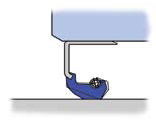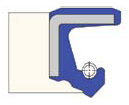
Standard radial shaft seals are not designed to operate in a pressurized system. The flex section is too thin and has no rigid support. Even a slight increase in pressure can force the outside lip surface to pivot about the contact width, decreasing the air side angle. This condition is called bell mouthing and its affects are irregular wear and shortened seal life. The maximum industry pressure for standard profiles is 7-10 psi (0.48 – 0.69 bar). When dealing with pressures in this range it is important to also consider shaft speed. The optimal pressure for standard radial shaft seals is near zero.

To choose a profile type the system pressure needs to be classified. Most radial shaft seals are designed for the standard pressure2pressure range. For applications in the medium / low range, the profile avaliability is significantly reduced. To accomodate for these pressures, the lip length must be shortened and the flex section increased in thickness. High classification pressures require an additional structural member to assist the primary lip from deflecting and extruding. For applications with pressures higher than 150 PSI, contact ESP engineering for recommendations.
| Pressure |
Classification |
| 0-10 psi (0-0.69 bar) |
Standard |
| 10-50 psi (0.69-3.45 bar) |
Low |
| 50-100 psi (3.45-6.9 bar) |
Medium |
| 100-150 psi (6.9-10.3 bar) |
High |
Parameters Affecting Sealing: